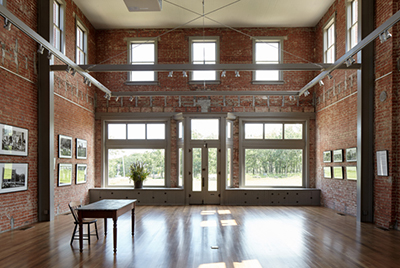The word “rural” can be hard to define. For many, the word conjures up images of rolling hills and vast farmland, tiny towns steeped in deep history and tradition. For some, it might mean the decline of a close-knit community brought on by advances in technology and the draw of bigger towns and cities nearby. A fluid definition is fitting as the characteristics and the needs of each rural community are vastly different.
At a recent Donor-to-Donor, Greater Kansas City Community Foundation donors gathered over lunch to discuss the role of philanthropy in rural communities. Representatives from organizations working to strengthen rural areas described the challenges these communities face and how philanthropy can play a part in building up rural populations.
Dell Gines, a certified economic developer with the Omaha branch of the Federal Reserve Bank of Kansas City focuses his work on improving the existing economy in rural communities. He explained how large corporations often seek to bring their business to rural economies but, in reality, existing smaller businesses are the ones that need to be cultivated and sustained in order for a rural economy to thrive.
Billie Hall, President and CEO of the Sunflower Foundation, works to make quality health care accessible to rural populations. Billie explained how hospitals and grocery stores are critical anchors in every community but are often the first to disappear in rural areas.
“Not only does the Sunflower Foundation work to help build access to health care, we also work to support nonprofits and their organizational capacity through grants,” Billie says. “For example, one nonprofit received a grant to upgrade its phone system, which dramatically impacted its ability to better provide services. The health department received a grant to purchase an electronic sign that visually advertised flu shots and the immunization rate skyrocketed.”
From vital community pillars like economy and healthcare to cultural centerpieces, philanthropy can play a critical role in the sustainment and growth of rural populations.

The Volland Store
Once a bustling general store and community gathering place in the rural town of Alma, settled in the Flint Hills of Kansas, the Volland Store had been closed and vacant since the death of its original owner in 1970. However, Patty and Jerry Reece recently took ownership of the dilapidated building and restored it to a community gathering space and a Flint Hills destination.
Patty shared how the Volland Store has been physically transformed: it now houses an art gallery, a space for community programs and an event venue. A residency program is available to artists looking to disconnect and reboot in the beauty of the Flint Hills. The restoration of the historical building has inspired other community buildings and projects to be brought back to life.
Each panelist emphasized the importance of giving back to rural communities as resources shift to larger, urban areas. Craig Peterson, Community Foundation donor and panel moderator shared how the Community Foundation’s expertise and service can help philanthropists give back to rural communities.
Donor-advised funds can serve as the perfect giving vehicle to support nonprofit organizations in rural areas or those working to serve rural populations. Learn more about donor-advised funds or contact us at info@growyourgiving.org to learn how you can give back.
Authored by: Ashley Hawkins, Content Specialist


